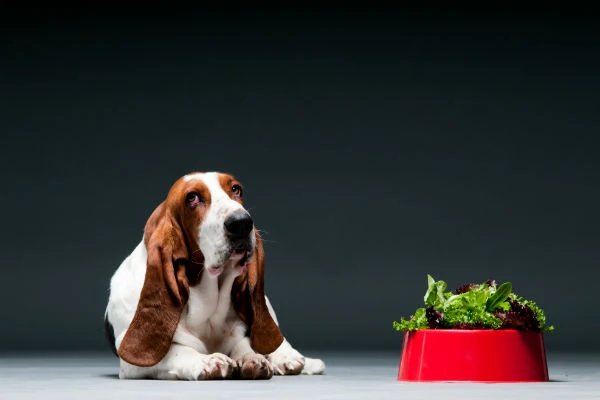Kale, former garnish, currently superfood, is therefore standard currently it even has bumper stickers and T-shirts advertising its virtues. It seems in health foods, smoothies, and salads, and is believed to possess varied health edges for people—but what regarding kale for dogs?
Is Kale Safe for Dogs?
A quick Google search reveals page once page of search results talking regarding all the advantages kale might need for dogs. sadly, a more in-depth look reveals that a lot of of those well-meaning articles lack veterinary sources. this is often problematic, since kale will cause medical issues for dogs.
Kale contains many probably harmful natural compounds, as well as metallic element salt and isothiocyanates.
Calcium salt, consistent with veterinary surgeon Mara Ratnofsky, will cause health problems like excretory organ and bladder stones. These problems sometimes resolve with veterinary treatment, however ar a decent argument against feeding kale ribs to dogs as a tasty treat. Dogs that ar susceptible to excretory organ or bladder stones ought to avoid alternative foods with high metallic element salt contents. These embrace spinach, beet greens, roots of beets, Swiss chard, collards, parsley, collards, leeks, quinoa, okra, and, of course, kale.
Isothiocyanates, that also are found in broccoli, create another drawback. Isothiocyanates are related to a lower risk for cancer in humans. In dogs, they'll cause gentle to probably severe stomachal irritation. Dr. Kraut Klein, chief veterinary officer for the AKC, states, “Broccoli is taken into account safe for dogs if the overall quantity eaten is a smaller amount than ten p.c of their daily intake. Over twenty five p.c is also thought of venomous.” Since broccoli and kale have similar levels of this compound and ar from an equivalent vegetable family, we will assume that whereas kale might be safe in tiny quantities, it ought to be avoided as an everyday treat.
Twenty-five percent of a daily diet might sound sort of a great deal, and for a retriever, it might be. For alittle or toy breed dog, however, which may be ingestion simple fraction of a cup or less of food daily, even many broccoli florets or kale stalks will create a risk.
Kale may interfere with thyroid operate if wolfed an everyday basis. Dogs with glandular disease might suffer medication interactions if fed giant amounts of kale on an everyday basis, and you will wish to debate alternative doable human food-related medication interactions along with your veterinary surgeon before feeding table scraps to your dog.
My Dog Ate Kale—What Do I Do?
Of course, we tend to can’t perpetually management what our dogs eat. Dogs have the way of snapping up fallen food at speeds that rival jet engines, and that they may entered trash cans, compost bins, or maybe your garden for a ivied inexperienced snack.
If your dog chow kale, the most effective issue you'll be able to do is monitor him closely for signs of enteral upset or excretory organ and bladder stones. Vomiting, diarrhea, problem urinating, or a amendment in excretion habits ar all signs that your dog might be littered with a condition like bladder stones that needs veterinary attention.
A small quantity of kale is perhaps harmless, however not all dogs react an equivalent means. Your dog’s size additionally plays a job. as an example, the quantity of kale your Labrador retriever will safely eat while not facet effects is way larger than the quantity your Yorkshire terrier will consume. you'll be able to perpetually decision your veterinary surgeon with any considerations you will have.
Is It Okay for My Dog to Eat Kale?
While in most cases, feeding occasional, small-to-moderately-small amounts of kale to dogs won’t cause any harm, some veterinarians could caution against feeding kale as a treat or as a neighborhood of a home-cured diet, particularly if there ar underlying medical problems or considerations. There ar many inexperienced alternatives for your dog to snack on it don’t create any potential health issues. Peas, inexperienced beans, and cucumbers ar safe for many dogs, and your veterinary surgeon will give you with a lot of info regarding healthy treats and home-cured diets.







0 Comments